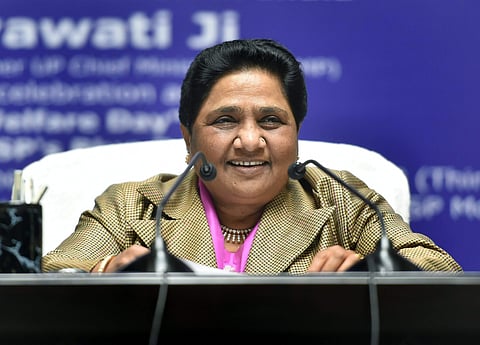BSP beyond Uttar Pradesh: Assumptions vs reality
With centrality in Uttar Pradesh, the Bahujan Samaj Party (BSP) is considered an electorally significant factor in 7 of 9 neighbouring states, barring Bihar and Jharkhand, on account of three factors — Dalit demography, the party’s ability of reach/cross 5 per cent of the popular votes and correspondingly, its supposed ability to transfer the same to allies.
from CPS, JNU. He is
associated with Peoples
Pulse
This electoral wisdom, coupled with statistical data and past voting trends, has shaped the debate regarding the ongoing/ensuing Assembly elections, particularly in Madhya Pradesh and Chhattisgarh. The argument goes that in these two states, the Congress would suffer on account of its failure to align with the BSP, as the latter not only has the ability to hold on to its Dalit support base in both states, but is quite capable of weaning away these electorates, who otherwise, would have voted for the former.
However, data and field insights don’t seem to substantiate these claims. A cursory look at the electoral performance of the party in the 7 of 9 states sharing a boundary with UP, namely Madhya Pradesh, Chhattisgarh, Rajasthan, Delhi, Uttarakhand, Haryana, Himachal Pradesh, besides Punjab — which, despite not being contiguous to the Hindi heartland is considered core to the BSP’s political investment — reveals four interesting trends.
First, the BSP achieves/crosses the 5 per cent vote mark primarily on account of its increasing tendency to contest nearly all the seats. This is solely driven by the BSP’s desire to retain its status of a national party rather than holding onto its committed Dalit support base. It’s common knowledge that any party contesting all the seats is likely get a common minimum denominator of the vote percentage.
Second, electoral data also reveals that while the party contests nearly all the Assembly seats in these states since 2007, its ability to win is extremely poor, broadly ranging from zero to three per cent of the total seats contested. This further endorses the argument that the BSP doesn’t have a committed support base in any of these states.
Third, a better criterion to test the impact a party wields could be to map the pattern of percentages of seats where it forfeits its deposit, i.e., it fails to garner 10 per cent of the popular votes. The BSP tends to forfeit deposits on 90-100 per cent of the seats it contests in these states.
Fourth, the BSP performed its best in these seven states in the Assembly elections that took place when the party was in power in Uttar Pradesh between April 2007 to March 2012. After its electoral defeat in 2012 in UP, its performance witnessed a colossal decline.
All the above factors unequivocally point out that the BSP neither has an electorally significant, committed Dalit vote bank outside UP, not does it have an organisational presence. Further, the high number of forfeited deposits also reveals the party doesn’t have a presence of electorally significant candidates.
At a time when political parties are investing in ground studies for proper feedback with respect to suitable candidates, the BSP appears to be out of sync with electoral common sense as it fares poorly with respect to having a pool of winnable candidates.
In this background, the argument that the BSP’s demand of around 50 and 20 seats in MP and Chhattisgarh, respectively, should have been accommodated by the Congress doesn’t hold ground. Giving more seats to the BSP would have gone to the advantage of the ruling BJP.At a time when the BSP’s appeal among the Dalit voters has declined even in Uttar Pradesh, expecting it to have a stronghold in bordering states would be wishful thinking. The cliché-cum-argument that the party must be given seats disproportionately higher than it deserves on the basis of its alleged capability to transform its ‘Dalit support base’ to electoral allies, falls flat as one can transfer a ‘committed vote’ only if its commands one.

